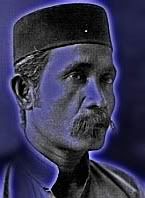Before You Grow Old
We are all gulity, sometimes, of bungling around without knowing where the head is or where hangs the tail. Dök tahu ppala èkör is normally used to describe such caper, when a person goes on blabbing out of their depth, or when a person intrudes in the middle of an argument and takes the wrong end of the stick, so to speak. Cats sometimes do this when they chase their own tail, but perhaps they are not all that clueless, perhaps they are having fun, it's hard to say. We'll have to think about Wittgenstein and his lion here.
The head (ppala) and the tail (èkör) are chosen here because they indicate direction, the head being on top in a person and in the front in an animal. If a person had a tail it would no doubt be placed in a part generally described as his back, but in an animal the tail is definitely its rear. So a person who does not know the head from the tail, dök tahu ppala èkör, does not really know the flow.
But you could do worse than chase your own tail. Take the kid who kicks the bin and pelts the dog and runs the stick on the picket fence at the bewitching hour. Dök jjuruh haröh, which is several grades below the clueless, for here is a deficiency in the department of pe'el. Now pe'el is from the Middle Eastern area, فعل (fe'el), which means behaviour.
“Tengok pe'el tu!” are words of warning, “Look at that behaviour!” and the pe'el could run a gamut of things - söngör for one, goes beyond funny. A söngör boy is funny beyond the bounds of acceptability. He pulls faces at Pök Su, the village elder, he laughs and jumps over Mèk Som's basket of kerepok lèkör, he giggles as he taunts all and sundry. A söngör person is never an adult and is almost always a boy. Then there's the headless chicken of a behaviour, nanör that is, a runner here and there sans direction or purpose, incorrigible behaviour beyond naka, beyond söngör and eventually heading for the Henry Gurney School.
"Dök jjuruh haröh sunggoh budök tu,” lacking in decorum (jjuruh) is he, lacking in direction (haröh) is that boy, and really, really so.
“Lekat pah ttua, kö'ör!” Kö'ör is an anxiety word, a fear that something will be so. Until adulthood that is – lekat pah ttua, when – God forbid – they become part of kaki hanyar, the flotsam and jetsam of our ordered society.
Labels: jjuruh, kaki hanya, naka, nanor, ppala ekor, songor

